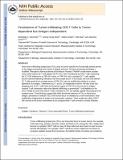Persistence of tumor-infiltrating CD8 T cells is tumor-dependent but antigen-independent
Author(s)
Olurinde, Mobolaji O.; Drake, Adam; Bai, Ailin; Chen, Jianzhu; Shen, Chase
DownloadChen_Persistence of.pdf (1.884Mb)
OPEN_ACCESS_POLICY
Open Access Policy
Creative Commons Attribution-Noncommercial-Share Alike
Terms of use
Metadata
Show full item recordAbstract
How tumor-infiltrating lymphocytes (TILs) that are tumor-specific but functionally tolerant persist in the antigen-expressing tumor tissue is largely unknown. We have previously developed a modified TRansgenic Adenocarcinoma of the Mouse Prostate (TRAMP) model where prostate cancer cells express the T-cell epitope SIYRYYGL (SIY) recognized by CD8 T cells expressing the 2C T-cell receptor (TCR) (referred to as TRP-SIY mice). In TRP-SIY mice, activated 2C T cells rapidly become tolerant following infiltration into the prostate tumor. In this study, we show that tolerant 2C T cells persist in the prostate tumor of TRP-SIY mice by proliferating slowly in a tumor-dependent, but antigen-, interleukin (IL)-7- and IL-15-independent manner. We also show that disappearance of 2C T cells from the lymphoid organs of TRP-SIY mice are due to antigen-induced T-cell contraction rather than altered trafficking or generalized T-cell depletion in the mice. Finally, we show that clonal T cells unreactive to SIY are equally capable of persisting in the prostate tumor. These findings suggest that while functional tolerance of TILs is induced by antigen, persistence of tolerant TILs in the tumor tissue is mediated by a novel mechanism: slow proliferation independent of antigen and homeostatic cytokines. These results also allow CD8 T-cell survival in the tumor environment to be compared with T-cell survival in chronic infection.
Date issued
2011-09Department
Harvard University--MIT Division of Health Sciences and Technology; Massachusetts Institute of Technology. Department of Biological Engineering; Massachusetts Institute of Technology. Department of Biology; Koch Institute for Integrative Cancer Research at MITJournal
Cellular and Molecular Immunology
Publisher
Nature Publishing Group
Citation
Olurinde, Mobolaji O et al. “Persistence of Tumor-infiltrating CD8 T Cells Is Tumor-dependent but Antigen-independent.” Cellular and Molecular Immunology 8.5 (2011): 415–423.
Version: Author's final manuscript
ISSN
1672-7681
2042-0226